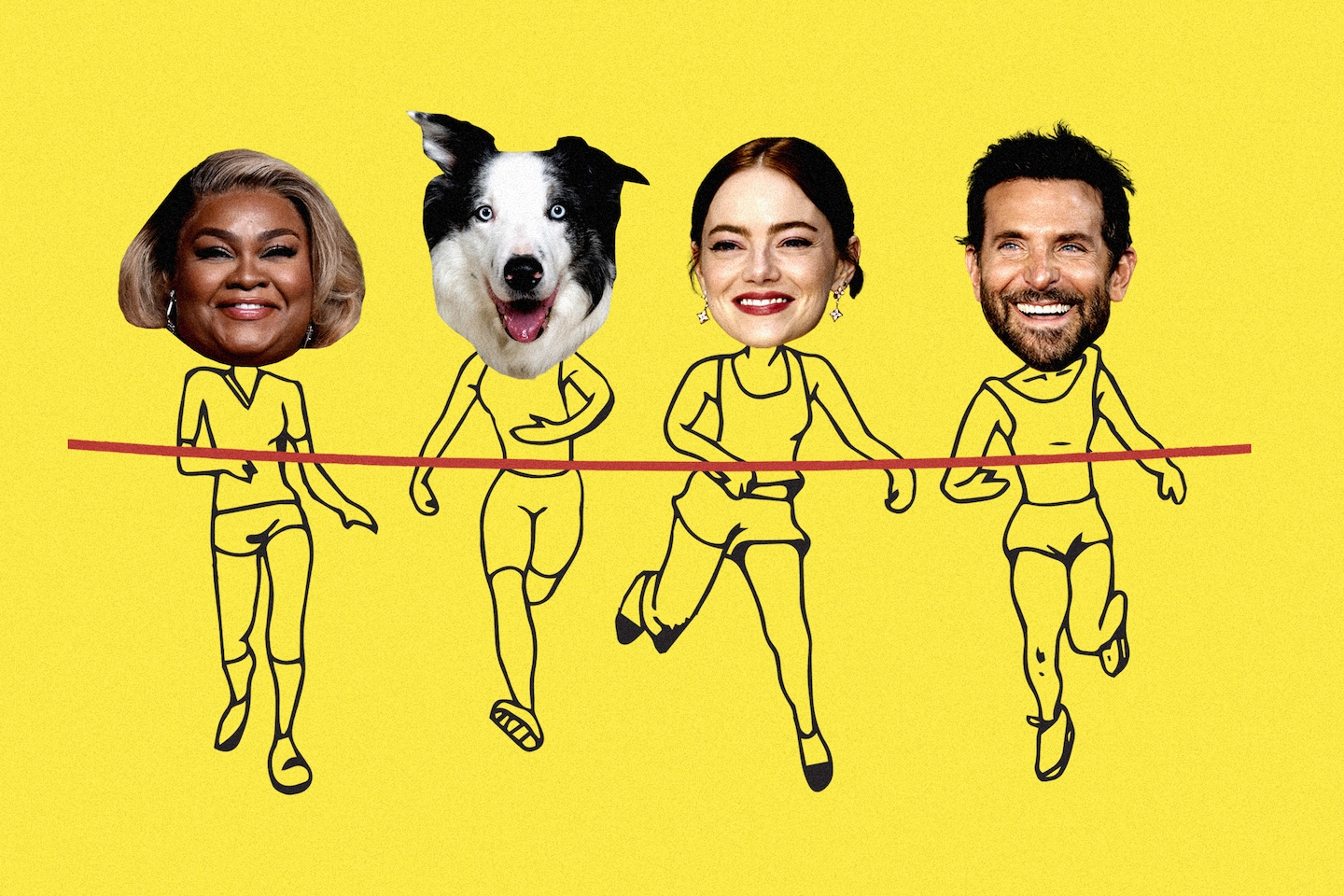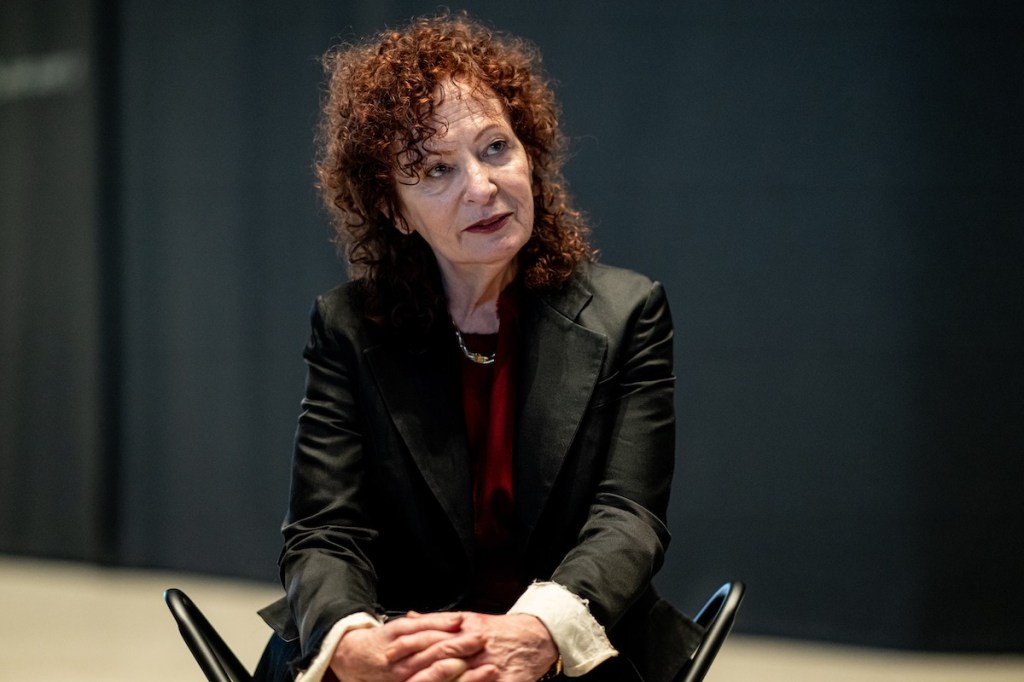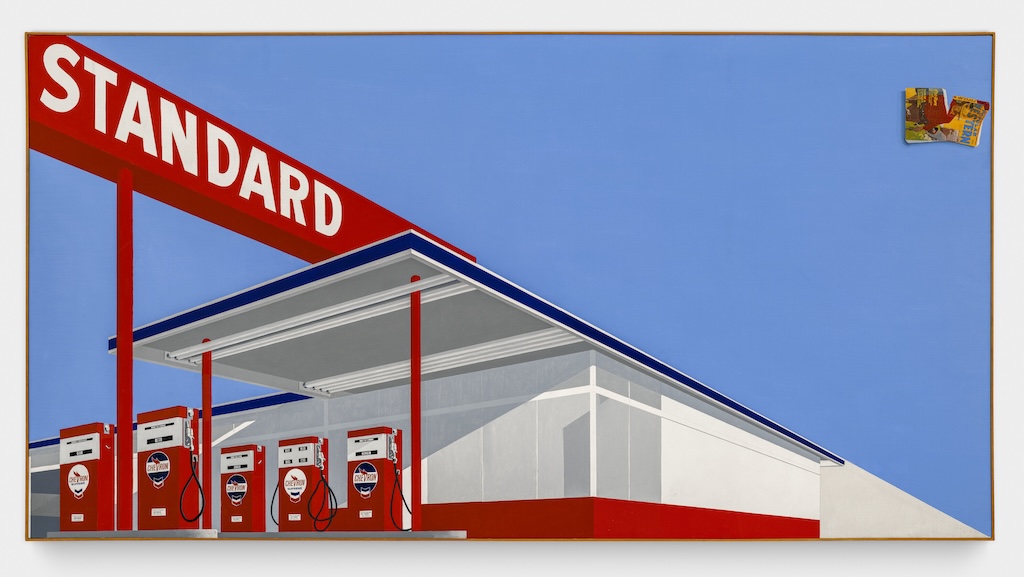This past weekend, Hollywood was in the equivalent of finals crunch week. Oscars voting had begun Thursday morning and would end Tuesday evening, and in the midst of that were three major awards shows — Screen Actors Guild, Film Independent Spirit and Producers Guild — the latter of which were back-to-back on Sunday after people had been up all Saturday night partying at the SAGs. “I am very slow,” said Justine Triet, blowing a raspberry, as she waited to be interviewed by the press room following her win for best international film at the Spirits. (She’d also just flown in from France, where two nights earlier “Anatomy of a Fall” had won six César Awards, including best film, best director and best actress, for star Sandra Hüller.)
The unspoken theme was how extremely high-stakes this pivotal stretch feels. Just as in a political campaign, most Oscar nominees were on the ground in Los Angeles to launch at-the-buzzer, in-person charm offenses, shaking hands in ballrooms and working the press lines.
It was all with the goal of making themselves visible and charming enough to get Academy voters to watch their movies or remember to check the box next to their names — especially in the tightest races, which pundits believe are best actress (Lily Gladstone, who won the SAG, tilting the race vs. Emma Stone), best actor (Cillian Murphy, who won the SAG vs. Paul Giamatti) and best adapted screenplay (“American Fiction” has won most precursors, but the Oscars alone put “Barbie” in this category, which makes it a wild card). But there was also distinct sense of nominees gingerly crossing a tightrope, trying not to say or do anything that could lose them all that carefully honed goodwill.
We’ll find out how those balancing acts worked on March 10, when the Oscars air on ABC. Until then, here’s our very unscientific list or what to do — or not do — when you’re trying to win over the Academy.
Do trot out your movie’s dog at every opportunity
Whichever publicist is behind the influx of articles about Messi, the border collie who plays Snoop in “Anatomy of a Fall,” you deserve a raise. The first sign of brilliance was when Neon circulated a flier about a press day with Messi, with the cheeky line, “All interviews are pending talent approvals.” But the great strategic move was to save Messi’s American debut until the Academy nominees luncheon, where he wore a blue bow tie and snuggled with everyone who wanted to, including Billie Eilish, who got on the floor to pet him.
Talking about a movie’s dog gives levity to a race and helps convince Academy members to see serious films they might be reluctant to check out. Indeed, this month, “The Zone of Interest” producer James Wilson tried to strike up a friendly rivalry between Messi and his film’s dog, Slava — owned by Hüller, who stars in both films. Wilson said on a panel that he thought for sure that “Zone” would win the coveted side prize for best performance by a dog at the Cannes Film Festival, where both films debuted. “And then we go see ‘Anatomy of a Fall’ with Sandra and it wins the Palme d’Or, and the f—ing Palm Dog!’” he said. “I love ‘Anatomy of a Fall,’ but just the idea that they also had a better dog …”
Don’t lose sight of your performance if you’re a multihyphenate actor
This is not to discourage actors from branching out into directing and producing. We love it! Create your own opportunities! But this year has shown that, for thespians who do it all, it’s important to pick a lane, otherwise Academy voters tend to overlook your achievements on-screen and reward the film overall instead. (See: Bradley Cooper and Margot Robbie, whose narratives promoting their projects focused on how hard it was to get their films made. He didn’t get a directing nomination; she didn’t get an acting nomination.)
Stone has been particularly adept at sidestepping this conundrum. At a Producers Guild of America breakfast panel Saturday, she reminded everyone that she was the newest behind-the-scenes person onstage, sitting among “iconic producers.” She spoke about figuring out how her “Poor Things” character, Bella, would walk or stuff 60 Portuguese tarts in her mouth, and dealing with everyone constantly asking about the film’s sex scenes and nudity. And whenever she talks about being a producer, it’s always in the context of how the role empowered her to steer Bella’s arc. Speaking to accusations that the film has a “male gaze,” she told Olivia Colman, “I think it takes away my agency here. … I am a producer. … This is the story that we wanted to tell.”
Do play it safe with speeches … if you’re a woman
As Da’Vine Joy Randolph and Gladstone have picked up award after award for “The Holdovers” and “Killers of the Flower Moon,” respectively, one thing has remained consistent: gracious speeches full of gravitas. Randolph often reads from something she’s written out, and at the SAGs, she encouraged fellow actors who were still waiting for their chance to keep going. Gladstone has often started off speaking in Blackfoot and at the SAGs gave tribute to what their union had achieved in 2023. Nothing as off-the-cuff or zany as men often get away with in their speeches, and that’s unfortunate.
“Women have always carried that burden of a double standard,” said “American Fiction” actress Erika Alexander at the Spirits. “It’s protection, too, because people will hold something you say against you even if you were just trying to be funny.” Added actor-director Zoe Lister-Jones: “I think it’s a different ballgame [for women]. Also, we’re in so much pain. We’re wearing such high heels, and we’re snatched within an inch of our lives. We can barely breathe, and we haven’t eaten in weeks. I like to hold Frances McDormand up on a pedestal. … She plays the boys’ game, in a way, where she just doesn’t give a f—.”
Do be an agent of chaos … if you’re Robert Downey Jr.
It’s a privilege of some A-list, usually male actors to be able to say whatever they want during an awards speech, not only with zero consequences, but also with such preternatural charm that voters keep checking off their names to see what they’ll do, finally, on Oscars night. (The TV-world examples are Pedro Pascal and Kieran Culkin.) Robert Downey Jr., who hasn’t won an Oscar, has now received his third nomination. And his run of always surprising speeches — at the SAGs, he mused, “Why me? Why now? Why do things seem to be going my way?” and thanked his wife for pretending to be a sane person happily married to an actor — has delighted industry players. “Only he can be that kind of agent of chaos because he’s him, in the same way that only he could be Iron Man or Tony Stark,” said a producer in the Academy who spoke on the condition of anonymity because, well, the biz.
Don’t ask friends to help promote your project
This year, the Academy announced new rules, telling members not to share or discuss their voting preferences, including anonymously to the press. This, by the accounts of Academy members who spoke to The Washington Post anonymously (they weren’t breaking the rules!), seems to be linked to the surprise, controversial nomination of Andrea Riseborough for best actress for “To Leslie” last year. The film was boosted by an aggressive word-of-mouth campaign led by director Michael Morris and his wife, and by friends such as Gwyneth Paltrow, Kate Winslet and Edward Norton. Riseborough and Morris were never sanctioned for potentially breaking rules that forbid, say, calling up your famous network and soliciting a promotional blitz. But they did fuel outrage for pulling moves that seemed to result in deserving performances from Viola Davis (“The Woman King”) and Danielle Deadwyler (“Till”) being shut out, leading to a nearly all-White set of nominees. The new rules make it harder for anyone to be overtly thirsty for a nomination. However, if you want to take out your own “For Your Consideration” ad — like Melissa Leo did in 2011 to win supporting actress for “The Fighter,” claiming that she had to because of a lack of press coverage due to ageism — that falls in the realm of gutsy public campaigning vs. private lobbying and is still totally inbounds.
As the war in Gaza continues to divide the industry and pro-Palestinian support is, seemingly, getting actors fired from jobs, it’s led to a particularly dry year where political speeches are concerned. (Let’s see what happens on Oscars night.) “The most heinous thing in the world is that the [International Court of Justice] found plausible acts of genocide happening in Gaza … and there’s a campaign of fear that has people self-censoring,” said director Boots Riley at the Spirits. But documentarians, at least, seem to be somewhat cushioned from blowback.
Kaouther Ben Hania, director of the Oscar-nominated “Four Daughters” — an experimental doc about Tunisian sisters who join ISIS — had already won for best documentary at the Spirits when a “Free Palestine” protester interrupted the awards. Ben Hania immediately went outside to support him and didn’t return to the tent. “It was amazing,” she told The Post. “I think he’s the hero of the day.” She said she was even more amazed that the police didn’t stop him. “We can say whatever we want in the United States, but if this was in another country, you will not last two minutes,” she said, adding that she thinks documentarians feel freer talking about politics, “because we are close to reality.” Only two other award recipients referenced the protester in their speeches: Iranian director Babak Jalali (“Fremont”) and “Certain Women” director Kelly Reichardt. Neither are Oscar nominees.
Do poke fun at the industry, but only at agents
The rule of Oscar campaigning is to be gracious to everyone in any part of the industry. But there’s one exception, where an actress can perhaps gain some cred among peers by making jokes about the most Teflon-skinned people in the biz: agents. Stone once again gave a master class in campaigning at Saturday’s PGA breakfast while talking about how she’s now producing movies she doesn’t star in. “I’m now having to learn what [producing] requires. And how many agents you have to talk to. Whoa!” she said, as the room of producers burst into laughter. “I got to have the best version of the [creative] experience out on [‘Poor Things’], and now I’m really paying the price.”
Hearing that, a producer and entertainment lawyer told The Post: “She’s not wrong! And agents can take it. All they care about is that they’re laughing all the way to the bank.”
The Oscars race is a lot like that America Ferrera speech in “Barbie.” You have to be out there advocating for yourself all the time, but you can’t appear to want it too much or else you seem desperate. Anne Hathaway is the classic example. Her seeming desperation for an Oscar drew criticism for years, though she was just praised for exhibiting that exact same “theater-kid energy” when she cried while Barbra Streisand got an honorary SAG Award. This year’s villain is Cooper, whose inability to hide his disappointment when he doesn’t win awards has become the source of countless memes. The internet narrative is that we ought to just give him an Oscar so we can spare him a total meltdown.
And the No. 1 perpetrator of this narrative is Cooper himself. At the PGA panel, he started off with what would become a running joke: talking as a producer about his difficult director (also himself). “The biggest challenge by far was the f—ing director,” he said, talking about how this maniac had “crazy demands,” such as shooting in black-and-white 35mm film and wanting to shoot live and on location. “We were losing our minds!” he went on. “But he looked to me like he had a good work ethic. I liked ‘A Star Is Born.’” It was funny, for maybe the first 30 seconds.
Do win the social media war
One could argue that Giamatti’s initial surge in the best actor Oscar odds came not when he won the Golden Globe for best actor in a musical or comedy, but the next day, when photos surfaced of him celebrating his win at In-N-Out Burger, still in his tuxedo, statue next to his food. It immediately cemented his status as the effable everyman, an excellent hard-working actor who’s long overdue for recognition — a status he doubled down on during his winner’s speech at the Critics Choice Awards the next week. “Wow, guys, I didn’t think my week could get any better than going viral for eating a cheeseburger,” he began, before asking for everyone to pray for him to get an endorsement deal.
That momentum’s since been tempered by Murphy’s SAG win, and he, too, has been a favorite on social media, in memes that celebrate him for being a very relatable high-functioning introvert forced to attend the most extroverted of celebrations, serenely strolling past shouting reporters or looking uncomfortable while posing for photographs.
correction
An earlier version of this story incorrectly said Bradley Cooper didn’t get an acting nomination in this year’s Academy Awards. He is up for best actor. The story has been updated.










